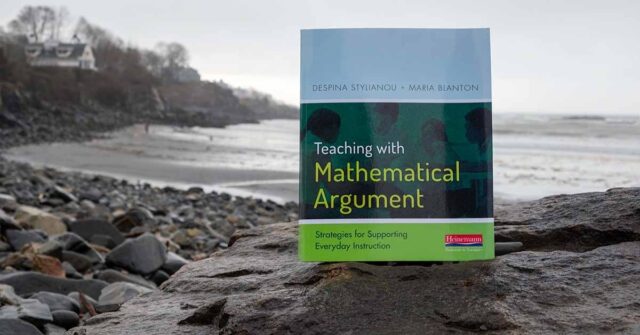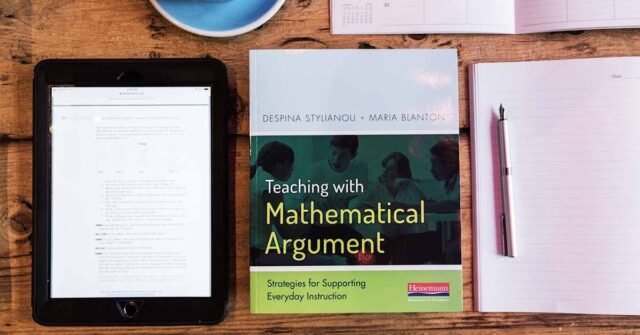
Adapted from Teaching with Mathematical Argument by Despina Stylianou and Maria Blanton
The ability to develop strong mathematical arguments develops over time. Argumentation must be at the center of our teaching, a routine part of our instruction, not just an afterthought that occurs then we "teach proving". As early as the first few days of the school year, we can set the priority of and expectations for argumentation.
For this, we may need to reconsider several aspects of our practice and our own habits: our curriculum, our classroom discussions, our room's configuration, the classroom norms and rules, and the type of homework tasks we assign. Building a classroom culture of argumentation is not an easy task, but it is richly rewarding.
Fostering Active Participation
As we build a supportive environment, we must also set the expectation that all students will participate actively in an ongoing discussion. For this, students need not only to be willing to share thoughts but also to respond in constructive ways. Argumentation is not an individual affair: rather it often takes a community to build a complete and sound argument. In particular, active participation supports students in selecting relevant mathematical ideas and concepts, making conjectures from their observations, analyzing information critically, reasoning inductively, and comparing differing viewpoints. It is as students learn to listen and build on each other's ideas that their understanding of argumentation matures. And for that, we need to establish a classroom culture that allows for communication to happen smoothly and organically. In order to establish such a culture it is important to be consistent with our expectations of students regarding classroom norms and that we, as teachers, also abide by these norms.
Encourage students to actively listen to their peers. Getting students to repeat an idea in their own words or to rephrase what a peer just said encourages active listening. Do this when an important idea emerges. Model good listening by giving all your attention to the student who is talking; do not allow others to interrupt and take your attention.
Encouraging Participation From All Students
While students should be expected to actively participate, not all students will be willing to share their arguments and thoughts with the whole class, no matter what routines are established. Students from diverse language backgrounds or struggling learners may lack the confidence or ability to articulate their thoughts in the common spoken language of the community. In that case, "think-pair-share" or, more simply, "turn and talk" is a valuable strategy for students who may need the extra time to put their thoughts together. Allowing a few moments for potentially reluctant students to think on their own and then sharing those thoughts in the safer environment of a partner or small group before they share them with the whole classroom can make a big difference.
•••
Learn more about Teaching with Mathematical Argument at Heinemann.com
 Maria Blanton is a Senior Scientist at TERC in Cambridge, Massachusetts. Prior to joining TERC, she was a Professor of Mathematics Education in the STEM Education Department at the University of Massachusetts, Dartmouth. Her work focuses on understanding issues of teacher and student learning associated with algebraic thinking in the elementary grades.
Maria Blanton is a Senior Scientist at TERC in Cambridge, Massachusetts. Prior to joining TERC, she was a Professor of Mathematics Education in the STEM Education Department at the University of Massachusetts, Dartmouth. Her work focuses on understanding issues of teacher and student learning associated with algebraic thinking in the elementary grades.
 Despina A. Stylianou is a Professor of Mathematics Education at The City College of New York. She is also the Director of Mathematics in the City, a center for K–8 professional development focused on mathematics education. Her research interests lie in the area of mathematical cognition; her work explores the mathematical skills, sensibilities, and habits of mind, and actions that are critical to doing, learning, and using mathematics proficiently.
Despina A. Stylianou is a Professor of Mathematics Education at The City College of New York. She is also the Director of Mathematics in the City, a center for K–8 professional development focused on mathematics education. Her research interests lie in the area of mathematical cognition; her work explores the mathematical skills, sensibilities, and habits of mind, and actions that are critical to doing, learning, and using mathematics proficiently.

